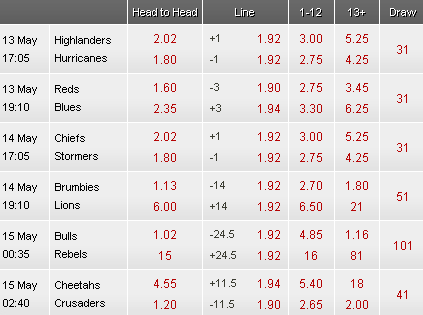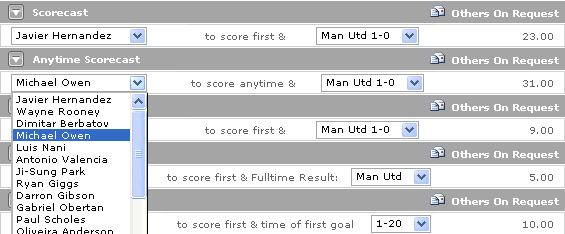You are here: Home >> Beginner’s Guide >> Multi Betting
A multi bet, also known as a multi, multiple, accumulator, parlay or all-up, is a bet that includes simultaneous selections on two or more outcomes in two or more events. If one or more of the selected outcomes does not occur then the bet automatically loses. Multi betting is riskier than using a string of single bets, but the potential payoffs are much higher.
Suppose you observe the following odds for a round of Super Rugby:

You have $30 to spend and you wish to make the following bets:
1. Head to head bet on the Highlanders at 2.02 odds
2. Head to head bet on the Reds at 1.60 odds
3. Line bet on the Rebels (+24.5) at 1.92 odds
Suppose you placed $10 on each selection and all three bets won. Your winnings would be:
Payout = ($10 * 2.02) + ($10 * 1.60) + ($10 * 1.92) = $55.40
Profit = $55.40 – $30 = $25.40
This equates to odds of 2.18 for a $30 bet (if you won all three).
Now suppose you create a multi bet using the same selections. With a multi bet the odds equal the product of the individual odds. Here the multi bet odds equal (2.02 * 1.60 * 1.92) = 6.205. Suppose you placed $30 on this multi bet and all three selections won. Your winnings would be:
Payout: $30 * 6.20544 = $186.16
Profit = $186.16 – $30 = $156.16
Is is very evident that a multi bet, even when using only three selections (also known as legs), can provide a much larger payout than three single bets.
In reality, the third bet on the Rebels would have lost, because the Bulls won 47-10. Your three single bets would have returned:
Return = ($10 * 2.02) + ($10 * 1.60) + ($10 * 0) = $36.20
Profit = $36.20 – $30 = $6.20
In contrast your multi bet would have lost $30.00. This illustrates the high risk, high reward nature of multi betting.
Single multiples
The rugby example above was a three-leg multi bet that required all three bets to win. A common term for a multi bet that requires every selection to win is single multiple, or parlay. Because our example contained three selections it is called a 3 Play Parlay, or a Treble. Some bookmakers place limits on how many selections can be used, with a typical cap of around eight. Below are other terms for multi bets that contain between two and five selections.
- Two selections: 2-leg multi / 2 Play Parlay / Double
- Three selections: 3-leg multi / 3 Play Parlay / Treble
- Four selections: 4-leg multi / 4 Play Parlay / 4 Folds
- Five selections: 5-leg multi / 5 Play Parlay / 5 Folds
Boxed multiples
In addition to single multiples, some bookmakers enable you to create multi bets that do not require every selection to be correct. These bets are called boxed multiples, or round robins. For example you could create a four-leg multi bet that requires three of the four selections to be correct (sometimes called a 3 leg multi x 4), or a six-way multi bet that requires four selections to be correct (referred to as a 4 leg multi x 15). Because the required number of winning selections is less than the total selections, there are numerous combinations of results that can result in a return. Note that our first example was called a 3 leg multi x 4. This reflects the fact that there are four ways in which the bet could win. Let A, B, C and D denote your selections. The four winning combinations are ABC, ABD, ACD and BCD. When you place a 3 leg multi x 4, you are actually creating four 3 leg multi bets, hence "x 4".
Similarly, with the 4 leg multi x 15 example, there are fifteen possible ways in which the bet could provide a return.
Boxed multiples can be expensive to purchase (note that flexi betting is not typically available). The reason is the multiplier on the end represents the quantity that your base bet will be multiplied by when added to your bet slip. If you wanted to bet $5 on a 4 leg multi x 15, then behind the scenes the bookmaker will create 15 separate 4-leg multi bets using your six selections. Each bet will be $5, so your total bet is $5.00 * 15 = $75.00.
Some bookmakers, like Centrebet, enable you to select a banker when placing a boxed multiple. A banker is a selection that is present in every combination of bets you combine. It reduces the number of winning combinations, which makes the bet cheaper to purchase. For example, if you set up a 4 leg multi that requires three selections to be correct, and has selection A as a banker, then the bet will be a 3 leg multi x 3, because only the combinations ABC, ABD and ACD are used in your bet. Similarly, choosing a banker for a 4 leg multi x 15 reduces it to a 4 leg multi x 10.
Exotic multiples
Some bookmakers offer exotic multiples, which combine one or more single bets and/or parlays. The combinations offered and nomenclature can vary from bookmaker to bookmaker. Below are a few exotic multiples offered by IASbet.
- Trixie – 4 bets consisting of 3 selections from different events
– 3 x 2 Play Parlay / Doubles
– 1 x 3 Play Parlay / Treble
At least 2 selections must win to earn a return. - The Patent – 7 bets consisting of 3 selections from different events
– 3 x Singles
– 3 x 2 Play Parlay / Doubles
– 1 x 3 Play Parlay / Treble
At least 1 selection must win to earn a return. - The Yankee – 11 bets consisting of 4 selections from different events
– 6 x 2 Play Parlay / Doubles
– 4 x 3 Play Parlay / Trebles
– 1 x 4 Play Parlay / 4 Fold
At least 2 selections must win to earn a return.
Exotic multiples provide payouts for a low number of winning selections, with the greatest payout achieved if every selection wins. Using the Patent as an example, if you have a $10 base bet and every selection has 2.00 odds, you get the following wager:
The Patent bet ($10 * 7 = $70 wagered in total):
- 3 singles at 2.00 odds
- 3 doubles at 4.00 odds (2.00 * 2.00)
- 1 treble at 8.00 odds (2.00 * 2.00 * 2.00)
The Patent returns:
- 0 winning selections: $0
- 1 winning selection: 1 winning single ($10 * 2.00) = $20
- 2 winning selections: 2 winning singles + 1 winning double = $20 + $20 + $40 = $80
- 3 winning selections: 3 winning singles + 3 winning doubles + 1 winning treble = $20 + $20 + $20 + $40 + $40 + $40 + $80 = $260
The Patent profits:
- 0 winning selections: -$70
- 1 winning selection: -$50
- 2 winning selections: $10
- 3 winning selections: $190
Note that additional scenarios would be created if the selections didn’t all have the same odds. This example simply illustrates the tiered nature of exotic multiple payouts based on the number of winning selections. Also note that to "earn a return" does not necessarily imply earning a profit.
Numerous other exotic multiples are available. For the following examples the numbers in brackets represent the number of bets, the number of selections and the required number of winning selections to earn a return, respectively:
- The Lucky 15 (15, 4, 1)
- The Super Yankee (26, 5, 2)
- The Lucky 31 (31, 5, 1)
- The Heinz (57, 6, 2)
- The Lucky 63 (63, 6, 1)
- The Super Heinz (120, 7, 2)
- The Goliath (247, 8, 2)
Related contingencies
Recall that in the rugby examples, each selection concerned a different fixture. Multi bets are not accepted if the outcome of one of your chosen events affects the outcome of another. These connected outcomes are called related contingencies. Below are a few examples:
- A multi bet on the Blues to lead at half time and the Blues to win the game.
- A multi bet on the first try scorer and the winner of the fixture (the the fact that a team scored at least one try has implications on the side’s chance of winning the fixture).
- Manchester United to beat Chelsea and Manchester United to beat Chelsea 2-0.
Many punters would like the ability to create multi bets using events in the same fixture, and some bookmakers do provide workarounds for this. For example, bet365 offers “scorecast” bets. These are single bets that incorporate more than one element of a football fixture. Below is a screenshot of the scorecast options for a fixture between Manchester United and Blackpool.
These single bets are essentially two-leg multi bets. For example the first scorecast is for Hernandez to score the first goal and for Manchester United to win 1-0, at 23.00 odds.
bet365 also supports single bets that combine the half time and full time scores.
Notes and Sources
|
<< Previous topic: Bookmaker Margins |
Next topic: Asian Handicap >> |



